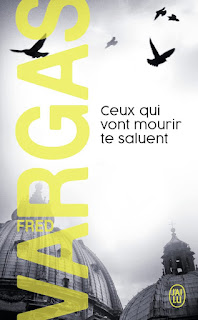Ceux qui vont mourir te saluent - Fred Vargas
Being Vargas of course, that means it's still not all that conventional. The crime and murder element is about as close as it gets to standard murder mystery, the characterisation is much less so. Henri Valhubert, a French art historian, has been presented with a rare unseen Michelangelo sketch and suspects that it might be part of a trafficking of items from the archives of the Vatican. He makes the journey to Rome, where his son Claude lives, hanging out with his friends David and Thibault, otherwise known as Nero and Tiberius, who with 'Claudius' make up a triumvirate of Roman rulers. Claude's stepmother Laura - worshipped to near adoration by all three boys - has also recently returned to Rome. All of them have a connection with bishop Monsignor Lorenzo Vitelli, a childhood friend of Laura, who is also looking after a young charge, Gabriella.
Henri is killed soon after arriving in Rome at a party in the Palazzo Farnese, killed by a concoction of hemlock (ciguë) mixed into a cocktail. It's a fairly obscure and ancient kind of use of poison which arouses suspicion and it seems like none of the family present at the party have a decent alibi. Henri's brother Edouard is a French government minister and, not trusting the Italian authorities, he sends an investigator Richard Valance as Special Envoy to look into it and hopefully bury the affair and any potential scandal. Valance is resistant to the idea, somehow knowing that he isn't going to like what he finds.
Well, considering the cast of characters that Vargas has created, that's a given. You have three young men in their late 20s who create a kind of inner force between them, a taciturn investigator with unconventional methods and Laura, the femme éternelle, who is clearly central to the drama and holds great influence over all the men in the drama. Then there's an investigation in art history and publishing, so this is definitely not your common crime thriller. Not least in the fact that Valence thinks he has solved it in the first half of the book, much of the information gathered for him from the work of an earlier private investigator.
He's only uncovered one part of the puzzle of course, and that part has indeed been influenced by his own experiences and his reading of the strange relationships that exist between all the players here. Vargas then delights in using the rest of the novel to delve deeper into the wider context and the extraordinary game of how the characters play off each other. It's not the typical technique of holding back information as knowing where to look for it, and Vargas gets it all out in the open with charismatic 'performances' from this eccentric cast of characters with histories and unfulfilled desires between them.
It's absolutely masterful, and although the first Adamsberg thriller L’homme aux cercles bleus (The Chalk Circle Man, 1991) showed a rare talent, Ceux qui vont mourir is the first almost fully formed indication of how Vargas could overturn expectations and the clichés of the crime fiction genre, or at least be capable of contorting them in unexpected and original ways. It's filled with wry humour and unforgettable characters that also avoid any standard conventional roles, and in Valance, we have another memorable creation and stage in the development - like Louis Kehlweiler in Un peu plus loin sur la droite and Sans feu ni lieu - of the Commissioner Adamsberg figure to come.
Reading notes: Ceux qui vont mourir by Fred Vargas. French paperback edition published by J'ai Lu.




Comments
Post a Comment